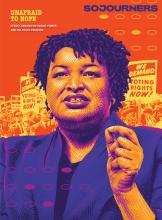IT IS TIME for radical change. This summer Black students in Oakland, Calif., demonstrated they deserve it—schools without police. After a 10-year organizing effort, students of the Black Organizing Project were victorious. The Oakland school board voted unanimously to pass the “George Floyd Resolution to Eliminate the Oakland Schools Police Department,” which will dismantle the school police department and redirect $2.5 million to pupils’ needs. Like students across the country, Oakland scholars want to reimagine safety because too many of them have been dehumanized, disrespected, and criminalized by police in their schools.
Following the brutal murder of Floyd at the hands of Minneapolis police officers in May, the United States has seen a surge in progress in the movement for police-free schools. While this demand is not new, the moment made it real.
The Minneapolis school board led the way when it unanimously voted to end its contract with the police department. Then Portland. Then Denver. Then Charlottesville, Rochester, Milwaukee, and San Francisco.
Fueled by Black and brown students, the police-free schools movement asserts that removing police from schools will increase students’ chance to thrive and feel safe from state violence. The presence of police in schools increases the chances of youth interaction with the criminal legal system. Whether we call them “school resource officers” or police, they enforce the criminal code. Moreover, police too often aggressively suppress what they perceive to be disobedience or disorder. They ticket, arrest, and violently impose their will upon young people.
Read the Full Article

